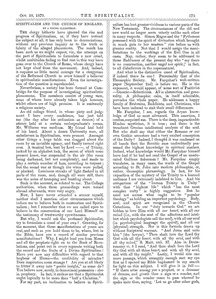Spiritualism and the Church of England
The clergy hitherto have ignored the rise and progress of Spiritualism, or, if they have noticed the subject at all, it has only been in denunciations, without any previous inquiry as to the truth or falsity of the alleged phenomena. The result has been such as we might expect, viz., the attempt on the part of Spiritualists to formulate a new creed, whilst multitudes failing to find rest in this way have gone over to the Church of Rome, whose clergy have not kept aloof from the movement. And, indeed, it requires no little moral courage for a clergyman of the Reformed Church to avow himself a believer in spiritualistic manifestations. Even the investigation of the question is reprehended.
Nevertheless, a society has been formed at Cambridge for the purpose of investigating spiritualistic phenomena. The members consist of young men, some of whom have already taken high honours, whilst others are of high promise. It is eminently a religious society.
An old college friend, in whose piety and judgment I have every confidence, has just told me (the day after his ordination as deacon) of a stance held at a certain undergraduate’s rooms. Mr. Williams was medium. My friend had hold of his hand. About a dozen University men, all unbelievers in Spiritualism, were present. Amongst other things a huge table was dragged about the room by an invisible agency, and finally turned right over. A musical box, lent by Lord—, of Trinity, locked by an alphabet lock, the secret of which none present knew, was suspended in the air (the room being darkened, but not completely), and made to play a certain number of bars, according to request; but the sound was as though the wires were pulled, or plucked. Luminous streaks of light flashed in all parts of the room, and, though all were still, there was the noise of tramping and bustling about.
Such is the account, as related to me. The College authorities, when these proceedings were noised abroad afterwards, were very angry.
Now, I have never attended a stance myself, neither shall I mention other circumstances which induce me to believe both in mesmerism and Spiritualism; but I remember that we are called upon to believe in the resurrection of our Lord Himself on the testimony of trustworthy eyewitnesses.
But why, I would ask the professed Spiritualist, try to formulate a creed of your own? Granting, for the moment, that these manifestations of yours are real, and such as you hold them to be, where, but in the Bible, have you a record of similar previous manifestations? Why, I might lead you from Moses and all the prophets right on to the Book of Revelations, and point out in every separate writing both the record and the fruits of a Divine Spiritualism! Have you now any difficulties with regard to that bugbear of Hume—the credibility of miracles? Does inspiration seem strange? Are you at all likely to fritter it away into “poetic insight,” as some do? You believe now, surely, in demoniacal possession: also in prophecy. In fact, it strikes me that a Spiritualist ought logically to be more than “half a Christian.”
For my part, an inclination to believe in Spiritualism has lent greater vividness to various parts of the New Testament. The circumstances of the old and new world no longer seem utterly unlike each other in many respects. Simon Magus and the “Pythoness possessed with the spirit of divination which brought in much gain to her masters” rise before us with greater reality. Not that I would assign the manifestations to the workings of the Evil One in all cases. Nay, rather, they seem to be addressed to those Sadducees of the present day who “say there is no resurrection, neither angel nor spirit;” in fact, to all disbelievers in the supernatural.
And what is the distinctive creed of Spiritualists, if indeed there be one? Presumably that of the Theosophic Society. Mr. Farquhar’s well-written paper (September 2nd) is before me. He is the exponent, it would appear, of some sort of Positivist—Gnostic—Eclecticism. All is abstraction and generality. A philosophic calm, in itself admirable, pervades the whole paper. He addresses a happy family of Brahmins, Buddhists, and Christians, who have been induced to sink their small differences.
Mr. Farquhar, I see, regards the Aryan know-ledge of God as most advanced. This assertion. I confess, surprised me. There is the deep, impracticable Hindoo mysticism, it is true; and there is the trenchant Grecian intellectual analysis of the soul. But who shall say that either the Romans or our own Gothic ancestors had a very exalted conception of the Deity? Indeed, I thought it was confessed on all hands that the Semitic race undoubtedly possessed the highest knowledge in spiritual matters. Indeed, what knowledge would Mr. Farquhar himself have bad if he had not read the Gospel of an uneducated Galilean fisherman? Mr. Farquhar simply translates, in many cases, the words of the Gospel? according to St. John into modern philosophic, or, rather, theosophic phraseology. In fact, for his exposition of the mystery of the Trinity to a learned audience I am extremely indebted to him. And his comparison of the “human Trinity in Unity” with that “highest life” which “has the most complex unity” is highly suggestive. But he need not accuse what ought to be “popular theology” as holding an imperfect psychology. Body, soul, and spirit are recognised in the Church Catechism. In our “duty towards God” we are bidden to love Him with all our heart, with all our mind (i.e., with the seat of the affections and intellect which psychologists call the soul), with all our soul (in psychological language the spirit), and all our n (physical) strength. Nor is this formula drawn up without Scriptural warrant. “And Jesus said unto him” (the lawyer), “Thou shalt love the Lord thy God with all thy heart, with all thy sold, and with all thy mind,” S. Matt. xxii. 37. Also in Deuteronomy vi. 5 I read, “And thou shalt love the Lord thy God with all thine heart, and with all thy soul, and with all thy might.” Lastly, I would cite one more passage, which strangely enough met my eye first as I opened my Bible haphazard in my search for light on this subject. I will give it in full:— “If there arise among you a prophet, or a dreamer of dreams, and giveth thee a sign or a wonder, and the sign or the wonder come to pass whereof he spake unto thee, saying, ‘Let us go after other gods, <... continues on page 10-66 >
Editor's notes
- ↑ Spiritualism and the Church of England by unknown author, London Spiritualist, No. 372, October 10, 1879, pp. 175-76
Sources
-
London Spiritualist, No. 372, October 10, 1879, pp. 175-76


